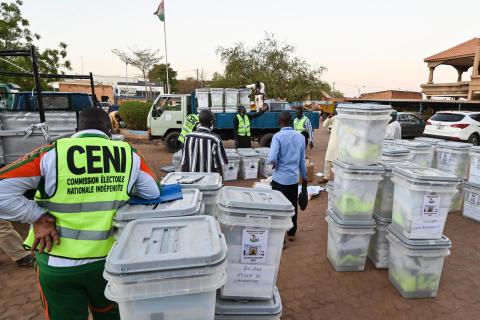
This is the first time since Independence that the country, the poorest in the world according to the UN, will be transiting from one elected president to another.
About 7.4 million Nigeriens are voting to elect legislators and the successor to President Mahamadou Issoufou.
This is the first time since Independence that the country, the poorest in the world according to the UN, will be transiting from one elected president to another.

According to Jeune Afrique, voting started by 9.00 am, an hour late, in one of the working-class neighbourhoods of Niamey, the capital city.
The elections are taking place amidst dual security challenges: incessant attacks from Al-Qaeda and Islamic State linked militants in Mali and Burkina Faso near its western border and those of Boko Haram near its border with Nigeria in the South-East.
The UN has said that 4,000 people died last year in Burkina Faso, Mali and Nigeria from violence and ethnic bloodshed instigated by Islamist militants.
Issoufou voted on Sunday with his wife and the president of the National Assembly.
He said he hopes the election “will allow Niger to consolidate its status as a model of democracy in Africa and in the world.”
More than 6,800 observers from various organisations are deployed around the country.
Niger's next president will have to deal with major problems, including extremism, poverty, displacement and corruption.
Attacks by Islamic extremists have affected local elections for weeks. In the most recent incident, the Nigeria-based Boko Haram fighters killed more than 28 people in Toumour in the Diffa region, the day before voting started.
Niger also faces increasing attacks from fighters linked to the Islamic State group and al-Qaida. Thousands of people have been killed and hundreds of thousands of people have been displaced despite the presence of thousands of regional and international troops.
Former foreign affairs minister, Mohamed Bazoum, the candidate of the current president’s Nigerian Party for Democracy and Socialism, is among the front runners in the election.
A teacher by training, Bazoum has promised to build boarding schools for girls to encourage them to stay in school longer, which he said would help reduce child marriage in a country with many teenage pregnancies.
Another candidate, retired Gen. Salou Djibo, a former head of state who staged a coup in 2010, has said he is best placed to fight extremism.
Ibrahim Yacoubou, a former foreign affairs minister who was kicked out of the ruling party because of indiscipline, is campaigning against corruption.
But Bazoum’s biggest competition comes from former President Mahamane Ousmane, who has the endorsement of opposition leader, Hama Amadou, whose candidacy was rejected by the constitutional court because of a one-year prison sentence for charges of human trafficking. Amadou denies the charges, calling them politically motivated.
If no one candidate wins more than 50%, Nigeriens will vote in a second round on Feb. 21.